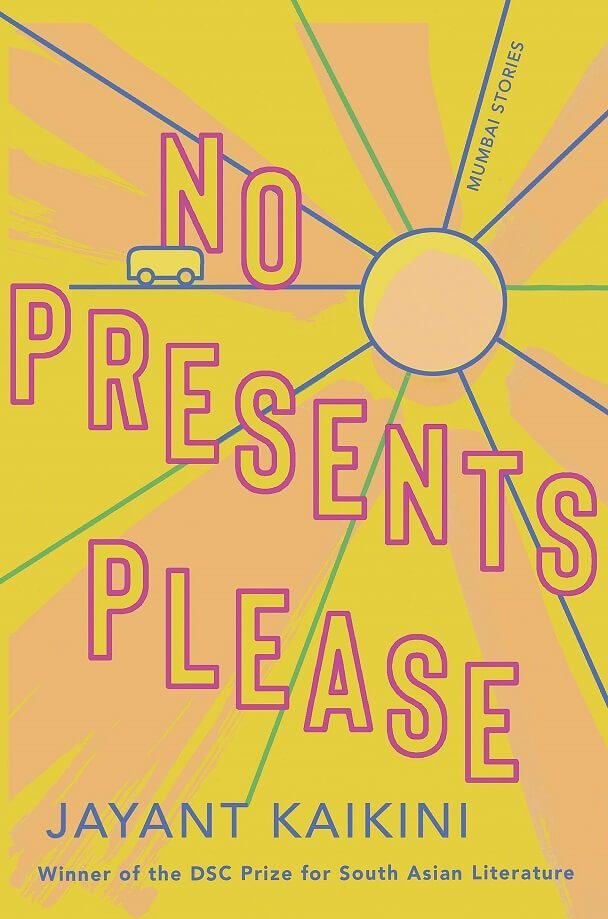Jayant Kaikini’s No Presents Please: Mumbai Stories (274 pages; Catapult; translated by Tejaswini Niranjana), originally published in 2017 and translated into English this year, strikes the balance between dense and utterly readable, bending reality into the surreal until the unfamiliar becomes familiar again. In his introductory note, prolific translator Niranjana indicates her primary challenge was “to maintain the ordinariness of the narrative until it could be maintained no longer,” and then articulate the shift when the “surreal began to seep into the story.”
The first story in the book’s collection, “Interval,” speaks to this quality: it’s a romance between Nandu, an attendant at a Mumbai cinema, and Manjari, a young woman and frequent patron of the theater. It has the generic familiarities of a romance; the story builds to their mutual escape, but there’s a glaring unfamiliarity between the two of them. They seem to hardly know each other, and once they make their escape, a startling twist disrupts the story’s expected ending. Kaikini signals from the start that these stories will rarely go in directions the reader anticipates.
One of my favorite stories in this collection, “Tick Tick Friend,” is about a tenth-grade girl, Madhubani, who has come to Mumbai with her father to participate in a quiz contest broadcasted from a studio located in a hospital basement. On its surface the odd configuration of story elements is hard to reconcile, but there’s a literal overlap between what goes on in these two settings: the fight for a livelihood. While Madhubani depends on the contest prize to fund her higher education, for the hospital patients above them it’s a literal struggle for survival. As one descends from the hospital floors to the studio,, their predicaments become distilled into quiz show questions: “What is this strain of penicillin called?,” “Is euthenasia legal in India?,” “Which Indian Olympic medalist is today living in a Kolkota slum?”
When the quizmaster asks Madhubani to name the date of the Bhopal gas tragedy, it disturbs her. After freezing up on set, she expresses frustration to her father:
“Fifteen thousand people died in Bhopal, not just four! Three lakh people are still suffering. What does that man know about all this? It’s merely a quiz question for him. I don’t want any of this…”
To write an impactful poem, it is said, you should cut it off two lines early. I don’t know if that’s necessarily good advice, but there’s a quality in Kaikini’s endings that speaks to this. One such example is “Inside the Inner Room,” a story about two spouses who have grown indifferent toward each other. When Antariksh gets Parul to become his girlfriend, his wife, Meera, shifts from initial irritation to developing a platonic but intimate relationship with Parul. In the end, they turn on Antariksh and live together. But later, when they mistake Antariksh for an intruder, Meera turns on Parul for not offering protection:
“If Antariksh had been here, he would at least have called the police,” Meera says. “I’m leaving tomorrow. I’ll go to my own home. You can die here for all I care.”
“‘But this is your own house, Bhabi. Why should you go anywhere?” Parul responds.
The stories in No Presents Please are tied together by Mumbai, their shared setting. The city is “like a mother watching wakefully over all the children asleep on her lap,” and the characters’ experiences are analogous to that. All of the protagonists are lower- to middle-class, or people who have come to Mumbai from elsewhere in India. In almost every story, Kaikini references Bollywood stars or films, contrasting with the collection’s cast of unglamorous, ordinary people.
In “Tick Tick Friend,” when Madhubani stops by the hospital canteen for a meal, an erratic young man in a hospital gown makes one request:
“If Kareena Kapoor comes to your quiz as a guest, please get her autograph for me on this paper boat. I’m crazy about her. She hides the entire universe’s moonlight inside her. That’s why there’s so much darkness around us. But if she smiles…wah! Please dear, get her autograph for me…”
But Kaikini makes a strong case for his brand of offbeat surrealism, proving that stories need not be attractive, reassuring or conventional to land with impact.


This nice and simple review at par with Jayant Kaikini’s stories refreshed my memories of each story. Feeling very nice.
The review compels me to read the book once again to search for a greater perspective.